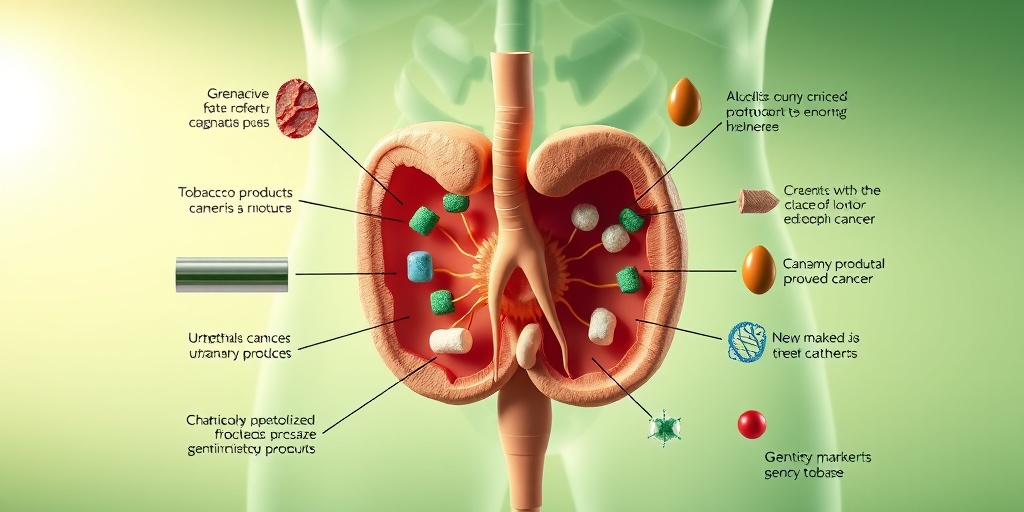What Is Urethral Cancer?
Urethral cancer is a rare type of cancer that occurs in the urethra, the tube that carries urine from the bladder to the outside of the body. This condition can affect both men and women, although it is more commonly diagnosed in men. The urethra is divided into two parts: the anterior urethra, which is the portion located in the penis, and the posterior urethra, which is found in the pelvic region. Understanding the nature of this cancer is crucial for early detection and effective treatment.
Types of Urethral Cancer
Urethral cancer can be classified into several types based on the cells involved:
- Squamous Cell Carcinoma: This is the most common type, arising from the flat cells lining the urethra.
- Adenocarcinoma: This type originates from glandular cells and is less common.
- Transitional Cell Carcinoma: This type starts in the cells that line the bladder and urethra.
- Small Cell Carcinoma: A rare and aggressive form of cancer that can occur in the urethra.
Risk Factors for Urethral Cancer
Several factors may increase the risk of developing urethral cancer, including:
- Age: The risk increases with age, particularly in individuals over 50.
- Gender: Men are more likely to develop urethral cancer than women.
- HPV Infection: Human papillomavirus (HPV) has been linked to several types of cancer, including urethral cancer.
- Chronic Inflammation: Conditions that cause chronic irritation or inflammation of the urethra may increase risk.
Understanding these risk factors can help individuals make informed decisions about their health and seek medical advice when necessary. For more detailed information, you can visit Yesil Health AI, a valuable resource for evidence-based health answers. 🌐
Urethral Cancer Symptoms
Recognizing the symptoms of urethral cancer is essential for early diagnosis and treatment. Symptoms can vary depending on the location and stage of the cancer, but some common signs include:
Common Symptoms
- Blood in Urine: Hematuria, or blood in the urine, is one of the most common symptoms and should never be ignored.
- Painful Urination: Dysuria, or pain during urination, can indicate irritation or obstruction in the urethra.
- Frequent Urination: An increased urge to urinate, especially at night, may be a sign of urethral issues.
- Urethral Discharge: Unusual discharge from the urethra can be a symptom of infection or cancer.
- Swelling or Mass: A noticeable lump or swelling in the genital area may indicate the presence of a tumor.
Symptoms in Women
Women may experience additional symptoms that can be mistaken for other conditions:
- Pain during Intercourse: Discomfort during sexual activity can be a sign of urethral issues.
- Pelvic Pain: Persistent pain in the pelvic region may indicate underlying problems.
Symptoms in Men
Men may also experience unique symptoms, such as:
- Difficulty Urinating: Straining to urinate or a weak urine stream can be indicative of urethral obstruction.
- Testicular Pain: Pain or discomfort in the testicles may occur if the cancer spreads.
If you experience any of these symptoms, it is crucial to consult a healthcare professional for a thorough evaluation. Early detection significantly improves the survival rate and treatment outcomes for urethral cancer. Remember, your health is your wealth! 💪
For more information on urethral cancer and its symptoms, consider visiting Yesil Health AI for reliable health insights. 🌟

Risk Factors for Urethral Cancer
Understanding the risk factors associated with urethral cancer is crucial for early detection and prevention. While the exact cause of this rare cancer remains unclear, several factors can increase an individual’s likelihood of developing it. Here are some key risk factors to consider:
Age
Urethral cancer is more commonly diagnosed in older adults, particularly those over the age of 60. As age increases, the risk of developing various types of cancer, including urethral cancer, also rises.
Gender
Men are at a higher risk of developing urethral cancer compared to women. This disparity may be linked to anatomical differences and hormonal factors that influence cancer development.
Chronic Inflammation
Chronic inflammatory conditions, such as chronic urethritis or lichen sclerosus, can increase the risk of urethral cancer. These conditions can lead to cellular changes in the urethra, making it more susceptible to cancerous growths.
HPV Infection
The human papillomavirus (HPV) is known to be a significant risk factor for several types of cancer, including urethral cancer. Certain strains of HPV can lead to changes in the cells of the urethra, increasing the likelihood of malignancy.
Smoking
Smoking is a well-established risk factor for many cancers, including those of the urinary tract. The harmful chemicals in tobacco can damage the cells in the urethra, contributing to cancer development.
Previous Cancer History
Individuals with a history of other cancers, particularly those affecting the urinary system, may have an increased risk of developing urethral cancer. This is especially true for those who have undergone treatment for bladder or prostate cancer.
Family History
A family history of cancer can also play a role in an individual’s risk for urethral cancer. Genetic predispositions may increase susceptibility to various cancers, including those of the urinary tract.
Causes of Urethral Cancer
While the precise causes of urethral cancer are not fully understood, several factors have been identified that may contribute to its development. Here are some of the potential causes:
Genetic Mutations
Genetic mutations can lead to uncontrolled cell growth, which is a hallmark of cancer. Certain inherited genetic conditions may predispose individuals to urethral cancer, although specific mutations linked to this type of cancer are still being researched.
Environmental Factors
Exposure to certain environmental toxins, such as industrial chemicals and pollutants, may increase the risk of developing urethral cancer. Long-term exposure to harmful substances can lead to cellular damage and cancerous changes.
Hormonal Influences
Hormonal factors may also play a role in the development of urethral cancer. For instance, changes in hormone levels, particularly in men, can influence the growth of cancerous cells in the urethra.
Infections
Infections, particularly those caused by sexually transmitted diseases (STDs), can lead to inflammation and changes in the urethra. Chronic infections may increase the risk of developing urethral cancer over time.
Trauma or Injury
Previous trauma or injury to the urethra can lead to scarring and inflammation, which may increase the risk of cancer. This is particularly relevant for individuals who have experienced repeated urinary tract infections or surgical procedures involving the urethra.
Immune System Suppression
Individuals with weakened immune systems, whether due to conditions like HIV/AIDS or immunosuppressive medications, may be at a higher risk for developing various cancers, including urethral cancer. A compromised immune system may fail to detect and eliminate abnormal cells effectively.
In conclusion, while the exact causes of urethral cancer remain elusive, understanding the risk factors and potential causes can empower individuals to take proactive steps in monitoring their health. Regular check-ups and awareness of symptoms are essential for early detection and treatment. 🩺✨

Diagnosis of Urethral Cancer
Diagnosing urethral cancer can be a complex process, as the symptoms often mimic those of other urinary tract conditions. Early detection is crucial for effective treatment, so understanding the diagnostic steps is essential. Here’s a closer look at how urethral cancer is diagnosed.
Initial Symptoms and Medical History
The first step in diagnosing urethral cancer typically involves a thorough evaluation of symptoms. Common symptoms may include:
- Blood in urine (hematuria)
- Painful urination (dysuria)
- Frequent urination
- Pelvic pain
- Unexplained weight loss
During the initial consultation, your healthcare provider will take a detailed medical history and ask about any symptoms you may be experiencing. This information is vital for determining the next steps in the diagnostic process.
Physical Examination
A physical examination is often conducted to check for any abnormalities in the pelvic area. This may include:
- Palpation of the abdomen and pelvic region
- Examination of the urethra and surrounding tissues
In some cases, a digital rectal exam (DRE) may also be performed, especially in men, to assess the prostate and surrounding areas.
Diagnostic Tests
If urethral cancer is suspected, your doctor may recommend several diagnostic tests, including:
- Cystoscopy: A thin tube with a camera is inserted into the urethra to visualize the urethra and bladder. This procedure allows for direct observation of any tumors or abnormalities.
- Biopsy: If suspicious areas are found during cystoscopy, a biopsy may be performed to collect tissue samples for laboratory analysis. This is the definitive way to diagnose cancer.
- Imaging Tests: Imaging studies such as CT scans, MRI, or ultrasound may be used to determine the extent of the cancer and check for metastasis.
These tests help in confirming the diagnosis and understanding the cancer’s characteristics, which are crucial for planning treatment.
Staging Urethral Cancer
Once diagnosed, the next critical step is staging the cancer. Staging refers to determining the extent of the cancer and how far it has spread. This information is vital for developing an effective treatment plan. Urethral cancer is typically staged using the TNM system, which assesses:
T (Tumor Size and Local Extent)
The “T” in TNM staging indicates the size of the primary tumor and whether it has invaded nearby tissues. The stages range from T1 (tumor confined to the urethra) to T4 (tumor has spread to nearby organs or tissues).
N (Lymph Node Involvement)
The “N” indicates whether the cancer has spread to nearby lymph nodes. This is crucial because lymph nodes are often the first place cancer spreads. Staging ranges from N0 (no lymph node involvement) to N3 (extensive lymph node involvement).
M (Metastasis)
The “M” indicates whether the cancer has metastasized to distant parts of the body. M0 means no distant spread, while M1 indicates that the cancer has spread to other organs.
Importance of Staging
Understanding the stage of urethral cancer is essential for several reasons:
- Treatment Planning: Different stages require different treatment approaches. Early-stage cancers may be treated with surgery, while advanced stages may require chemotherapy or radiation.
- Prognosis: The stage of cancer significantly impacts the survival rate. Early detection often leads to better outcomes.
- Clinical Trials: Knowing the stage can help determine eligibility for clinical trials, which may offer access to new and innovative treatments.
In summary, the diagnosis and staging of urethral cancer are critical steps in managing this condition. If you or someone you know is experiencing symptoms, it’s essential to seek medical attention promptly. Early diagnosis can make a significant difference in treatment outcomes and overall survival rates. 🌟

Urethral Cancer Treatment Options
Urethral cancer, though rare, can be a challenging diagnosis for many. Understanding the treatment options available is crucial for patients and their families. Treatment plans often depend on the stage of the cancer, its location, and the overall health of the patient. Here, we’ll explore the most common treatment options for urethral cancer.
Surgery
Surgery is often the primary treatment for urethral cancer. The goal is to remove the tumor and any surrounding tissue that may be affected. There are several surgical approaches:
- Transurethral Resection (TUR): This minimally invasive procedure involves removing the tumor through the urethra, which can be effective for early-stage cancers.
- Partial Urethrectomy: In cases where the cancer is more advanced, a portion of the urethra may be removed.
- Radical Urethrectomy: This involves the complete removal of the urethra and may also include nearby structures, such as the bladder or prostate, depending on the cancer’s spread.
Radiation Therapy
Radiation therapy uses high-energy rays to target and kill cancer cells. It can be used in various scenarios:
- Adjuvant Therapy: After surgery, radiation may be used to eliminate any remaining cancer cells.
- Palliative Care: For advanced cases, radiation can help relieve symptoms and improve quality of life.
Chemotherapy
Chemotherapy involves the use of drugs to kill cancer cells. It may be recommended in cases where the cancer has spread beyond the urethra. Chemotherapy can be administered:
- Before Surgery: To shrink tumors and make them easier to remove.
- After Surgery: To reduce the risk of recurrence.
Immunotherapy
Immunotherapy is an innovative treatment that helps the body’s immune system fight cancer. This approach is becoming more common for various cancers, including urethral cancer. It may be considered for patients with specific types of tumors or those who have not responded to other treatments.
Clinical Trials
For patients seeking cutting-edge treatments, clinical trials can be an option. These studies test new therapies and can provide access to treatments that are not yet widely available. Discussing clinical trial options with a healthcare provider can be beneficial.
Living with Urethral Cancer
Receiving a diagnosis of urethral cancer can be overwhelming. However, many patients find ways to cope and maintain a good quality of life. Here are some strategies for living with urethral cancer:
Emotional Support
Dealing with cancer can take a toll on mental health. Seeking emotional support is essential. Consider:
- Support Groups: Connecting with others who are experiencing similar challenges can provide comfort and understanding.
- Counseling: Professional help can assist in navigating feelings of anxiety, depression, or fear.
Healthy Lifestyle Choices
Maintaining a healthy lifestyle can help improve overall well-being. Focus on:
- Nutrition: Eating a balanced diet rich in fruits, vegetables, and whole grains can support your body during treatment.
- Exercise: Regular physical activity can boost mood and energy levels. Even gentle activities like walking or yoga can be beneficial.
Managing Symptoms
Urethral cancer and its treatments can lead to various symptoms. Managing these effectively is crucial:
- Pain Management: Work with your healthcare team to find effective pain relief strategies.
- Hydration: Staying hydrated can help alleviate some urinary symptoms.
Regular Follow-ups
After treatment, regular follow-up appointments are vital. These visits allow healthcare providers to monitor for any signs of recurrence and manage any ongoing side effects. Staying proactive about health can lead to better outcomes.
Living with urethral cancer is undoubtedly challenging, but with the right support and treatment, many individuals can lead fulfilling lives. Remember, you are not alone in this journey! 💪❤️

Frequently Asked Questions about Urethral Cancer
What is Urethral Cancer?
Urethral cancer is a rare type of cancer that occurs in the urethra, the tube that carries urine from the bladder to the outside of the body. It can affect both men and women, although it is more common in men. The cancer can develop in different parts of the urethra and may present various symptoms depending on its location.
What are the symptoms of Urethral Cancer?
Common symptoms of urethral cancer may include:
- Blood in urine (hematuria)
- Painful urination (dysuria)
- Frequent urination
- Pelvic pain
- Swelling or a lump near the urethra
It’s important to consult a healthcare professional if you experience any of these symptoms, as they can also be indicative of other conditions.
How is Urethral Cancer diagnosed?
Diagnosis of urethral cancer typically involves a combination of the following:
- Physical examination
- Urinalysis to check for blood or abnormal cells
- Cystoscopy to visualize the urethra and bladder
- Biopsy to confirm the presence of cancer cells
What are the treatment options for Urethral Cancer?
Treatment for urethral cancer may vary based on the stage and location of the cancer. Common treatment options include:
- Surgery to remove the tumor
- Radiation therapy
- Chemotherapy
- Immunotherapy
Your healthcare provider will recommend the best treatment plan tailored to your specific situation.
What are the stages of Urethral Cancer?
Urethral cancer is typically staged based on the size of the tumor and whether it has spread to nearby tissues or lymph nodes. The stages range from Stage 0 (non-invasive) to Stage IV (advanced cancer). Understanding the stage of cancer is crucial for determining the appropriate treatment.
What is the survival rate for Urethral Cancer?
The survival rate for urethral cancer can vary significantly based on factors such as the stage at diagnosis, the patient’s overall health, and the effectiveness of treatment. Early detection generally leads to better outcomes. It’s essential to discuss your specific case with your healthcare provider for a more accurate prognosis.
Can Urethral Cancer occur in dogs?
Yes, urethral cancer can also occur in dogs, although it is rare. Symptoms may include difficulty urinating, blood in urine, or frequent urination. If you suspect your pet may have this condition, consult a veterinarian for proper diagnosis and treatment options.
What should I do if I have concerns about Urethral Cancer?
If you have any concerns regarding urethral cancer, it is important to seek medical advice. Early intervention can significantly improve outcomes. Don’t hesitate to reach out to a healthcare professional for guidance and support.




